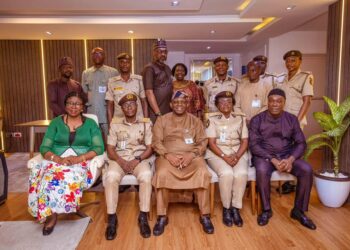Since 1999, Nigeria has added May 29 of every year to its long list of work-free days. The day is essential because it was on that day that Nigeria’s current democratic experience commenced.
Any attempt, therefore, to appraise the nation’s maritime sector since May 29, 1999 will invariably necessitate looking at issues like: port concession and associated issues, Customs reforms, maritime safety and security as well as Nigeria’s status within the comity of maritime nations.
The maritime industry arguably holds the unenviable records of being the only sector with the highest turn over of ministers and Chief Executives. Since 1999, the sector has had: Dr Mrs Kema Chikwe, Chief Ojo Maduekwe, Dr Abiye Sekibo, Alhaji Habib Aliyu, Prince Okechukwu Emeka, Alhaji Isa Bio and lately, Alhaji Yusuf Suleiman. The same goes for both the Nigerian Ports Authourity and Nigerian Maritime Administration and Safety Agency and of course; the Nigeria Customs Service; all of which have had at least, five chief executives.
The greatest benefit of 11 years of democratic rule is port concession which has transformed the nation’s seaports into a saner and more profitable venture, unlike what obtained in the past when the port system was a haven for all manners of illegalities including: discharge of unmanifested cargoes, under payment of revenues that are due to the government, cargo vandalisation and theft, uncontrolled human and vehicular traffic, and a host of other vices.
All that is gone, as the ports are now better and more profitably operated, even though with complaints from freight forwarders about high charges. But, port users will agree that port operations in 2010 is a lot better than that of pre-1999. Cargo throughput has soared; turn around time for vessels have reduced while cargo dwell time has also improved.
This is however not to say that there are no challenges in the ports any longer. But the challenges are basically operational and they predate the May 29, 1999 return to democratic rule.
The greatest failure of democratic dispensation is most visible in the state of the nation’s waterways and territorial waters where sea robbers and pirates have taken over; seizing ships and fishing trawlers, stealing cargoes and catches and sometimes maiming and killing crews on board the crafts.
It has been confirmed that many of these sea robbers are actually militants within the Niger Delta region who have found vocation in that ‘trade’ in between elections. It is condemnable that these sea robbers were once ‘errand boys’ to politicians who armed them preparatory to elections.
A lot of people have argued that the rising pace of militancy and insecurity on our waters is a fall out of return to democracy and that the prominence would not have been, had it been that the military was still in power.
As much as we are not military apologists, we are wont to agree that democracy has offered a thriving platform for militancy and sea robbery to take over the nation’s waters.
For this menace, we have always held both the Nigeria Navy and the Nigerian Maritime Administration and Safety Agency (NIMASA) responsible and it is our sincere opinion that the sooner the two agencies put their acts together on this issue the better for the nation’s maritime sector.
We have always also held the belief that without democracy, Nigeria may not have been able to sit on the Council of the global International Maritime Organisation (IMO); a position which Nigeria retained in November, 2009.
There are a few other achievements, but we will like to stress here that a lot more is wrong in the way democracy has turned the chief executives to absentee heads of the various agencies. They are hardly on ground to attend to issues as they unfold in their respective agencies. They are always in Abuja; either answering questions from their supervisory ministers or as guests to the various committees of both chambers of the National Assembly. A lot of valuable man-hour is lost as the CEOs shuttle between the commercial capital city of Lagos and the capital city of Abuja. The impact of their absence is better felt when serious operational and administrative issues are kept waiting for them.
That is why we acknowledge the comparison that some people have drawn between the military and democracy. Those who frown at the valuable time that is usually lost when CEOs answer the calls of the various committees at both the Senate and the House of Reps and their supervisory minister indeed have a point. The military has no time for the time –consuming ritual called “oversight function”.
We are by no means advocating ‘militocracy’, but we will like to put it on record that the frequent visits to Abuja by the CEOs and the tolls test such visits take on activities of their agencies are some of the avoidable pains of democracy.
















Discussion about this post